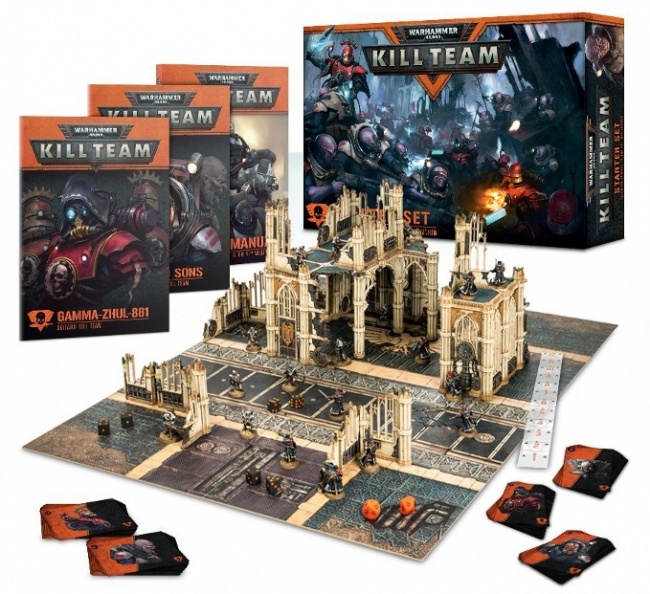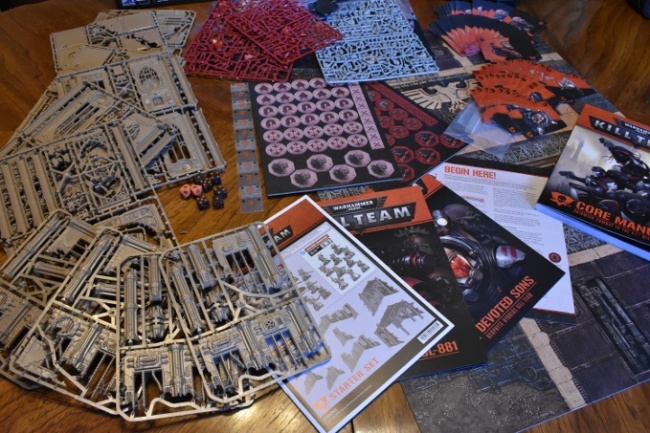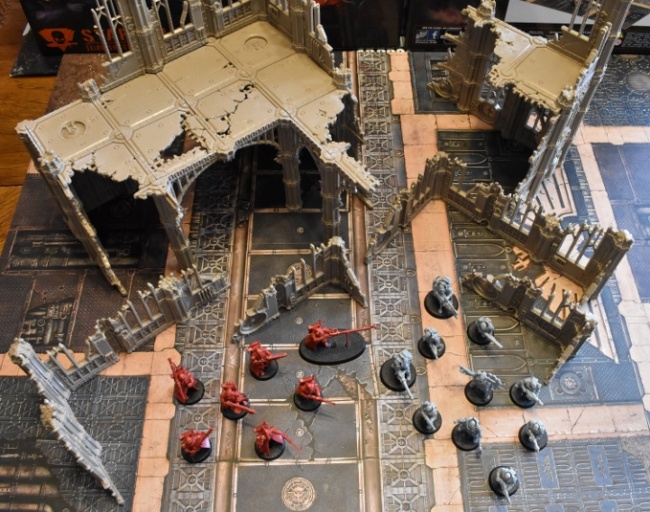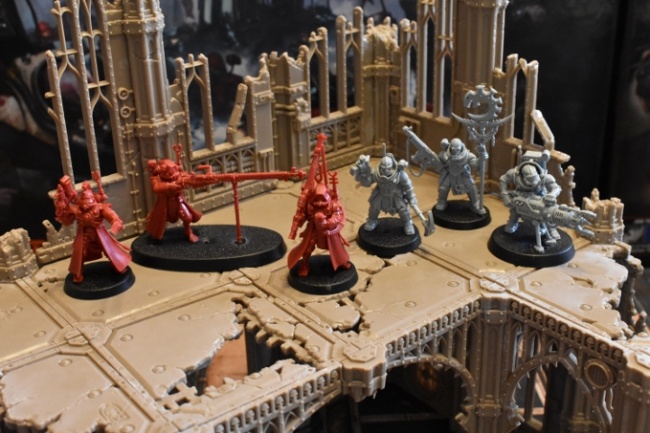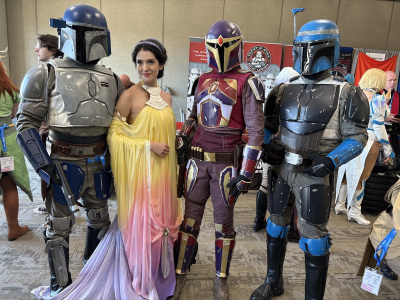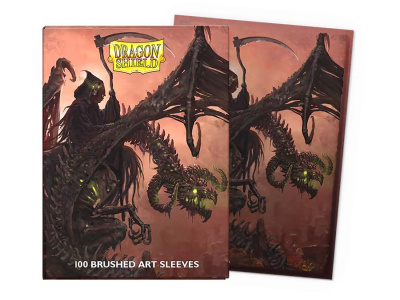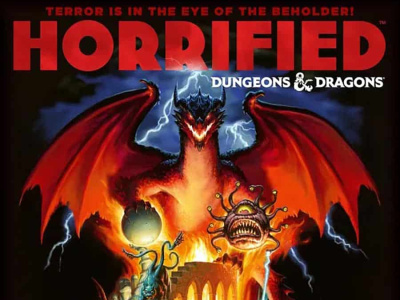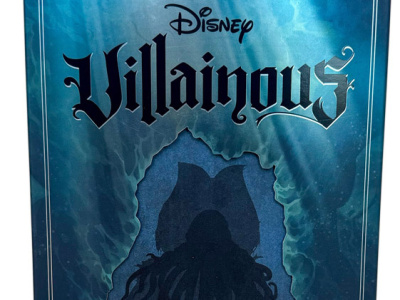Warhammer 40,000: Kill Team Starter Set
Publisher: Games Workshop
Release Date: July 28, 2018
MSRP: $130.00
Game Designer(s): GW Staff
Format: Miniatures Game
Number of Players: 2 or more
Playing Time: 45 minutes or more
UPC #: 5-011921-103324
Age Rating: 12 and up
ICv2 Rating: 4 Stars out of 5
Warhammer 40,000 is, in many ways, big. It offers massive battles with dozens of combatants, monstrous war machines, and squadrons of vehicles. But what if you are looking for something a little smaller? Recognizing this need, Games Workshop has offered up Warhammer 40,000: Kill Team, a skirmish scale version. But is this just a stripped-down version, or does it have a soul of its own?
Summary: In Kill Team, small groups of elite troopers pursue clandestine missions behind enemy lines or deep in no-man’s-land. Battles are restricted to only infantry (though that definition is a bit blurry in the science fiction battlefield), and "armies" are limited to between five and 20 combatants. Many of the core rules—how models move, shoot, and fight—are virtually identical to Warhammer 40,000, but there are a lot of new features as well.
Those who want to get in on the Kill Team action could simply pick up the Core Manual, but the Starter Set offers a more convenient jumping off point, with not only the Core Manual, but also two complete teams (representing the cybernetic Adeptus Mechanicus and the subversive Genestealer Cult), some rather nifty terrain pieces, a playmat, and all the accessories needed to play the game, including very helpful reference cards.
Originality: When approaching Kill Team, the real question is "what makes it different from Warhammer 40,000?" The scale is only the most obvious distinction: Kill Team is about smaller battles between smaller groups, and this naturally leads to a game with shorter playing times. But they did more than just shrink the game down. In Kill Team, every model is its own character, operating independently, and many have their own unique abilities. Game play is more interactive, replacing the "I go, you go" system in most phases with one in which players alternate activating one model at a time, reducing downtime and increasing player interaction. Combat resolution is a bit more granular, with range and cover having a greater impact. But perhaps most intriguing is the built-in campaign system. Players are invited not only to build their team, but to name every combatant and give them personality quirks. Between games, the fate of these warriors is discovered, and a model that was "killed" in one game may survive to fight again, and team specialists can learn new and improved skills and abilities. This forces players to be more strategic in their thinking: you can’t pursue victory at all costs regardless of consequences, because you may need that skilled sniper in a future mission...
Presentation: Games Workshop continues its recent trend in boxed sets, with carefully packaged game materials protected from damage in shipping (this time using what can best be described as printed posters to prevent pieces from abrading each other). As always, the artwork is top notch and compelling, the graphics are attractive and readable, and the outer packaging includes all the information a potential buyer needs. It is worth noting that this is not a flimsy slip-cover clad box: Kill Team comes in a sturdy, heavy cardboard box worthy of the Astartes themselves. It probably has to, seeing that this game weighs in at an impressive 10 pounds according to my scale!
Quality: The components inside the box are of excellent quality. I was surprised to find that the Core Manual was a softcover book, but I think I prefer it in this case as it is lighter and easier to flip through. The Core Manual is also almost entirely rules. Only a tiny section of the 208-page volume is background, and I was extremely pleased that it includes the rules and stats for almost every Warhammer 40,000 faction, rather than requiring players to pick up a library full of supplements. The Starter Set also has eight terrain pieces of various sizes, allowing players to construct impressive 3D battlefields right out of the box, while the 20 troopers are all the fine quality Workshop is famous for, and the cards and tokens are nice thick stock that will stand up well to use.
Marketability: Comparing what’s in the Kill Team box to similar products in the Warhammer 40,000 line, the Starter Set is a bargain, and everything in the box is fully compatible with both games. Since the rules include almost every faction, players who are already invested in a 40,000 army can easily bring their existing collections to bear in Kill Team as well, making the transition almost painless, while the campaign style of play will encourage them to custom build their "perfect" team of operatives. Games Workshop is planning an aggressive support program for the game, with add-on kits featuring new warriors to deploy, new factions and sub-factions, and new terrain to fight over, which is likely to help build up a fan base for the game moving into the future.
Overall: Kill Team offers the core experience of Warhammer 40,000 with lower entry threshold thanks to the smaller number of models required to play, faster-paced mechanics, and a shorter playing time, while simultaneously adding features that make it a distinctive experience of its own, at once fresh and yet familiar. Add in a campaign system that is ready made for league-style play and extensive support from the publisher, and it has a lot of potential staying power. The Starter Set is remarkably complete in itself, yet also serves as an excellent gateway to an already-rich and thematic setting that has legions of fans all around the world.
Kill Team is not just "Warhammer 40,000 light." The new mechanics offer new tactical challenges while the campaign system forces long-view strategic thinking. The shorter playtime makes it suitable for an evening’s entertainment, and the campaign rules can draw players back to the table again and again. And that’s why I’m giving this game 4 out of 5.
-- William Niebling
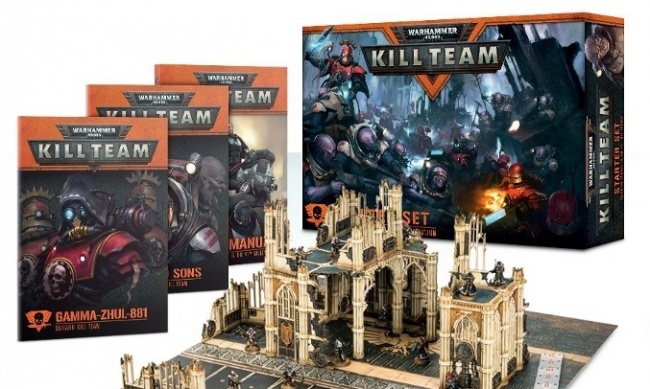
ICv2 Stars: 4 (out of 5)
Posted by William Niebling on July 23, 2018 @ 4:38 pm CT
MORE GAMES
Inside and Outside the Con
August 7, 2025
Cosplayers and re-enactors showed off their talents both inside and outside the convention center.
From Arcane Tinmen
August 7, 2025
Arcane Tinmen will release Dragon Shield: Halloween accessories into U.S. retail.
MORE REVIEWS
ICv2 Stars: 3.5 (out of 5)
July 30, 2025
Here is a review of Ravensburger's Horrified: Dungeons & Dragons.
ICv2 Stars: 3.5 (out of 5)
July 24, 2025
Check out the review of Disney Villainous: Treacherous Tides, from Ravensburger.



